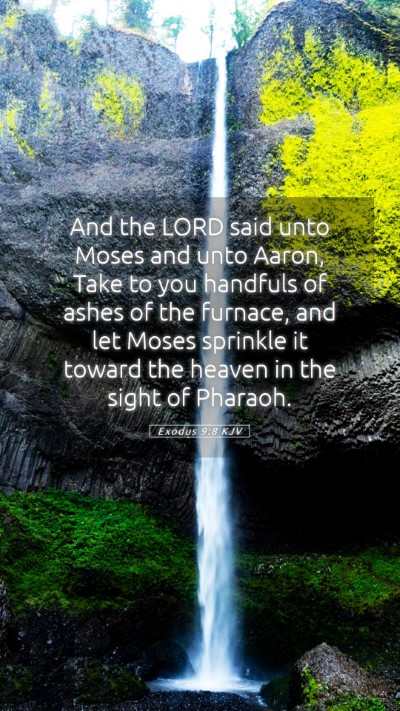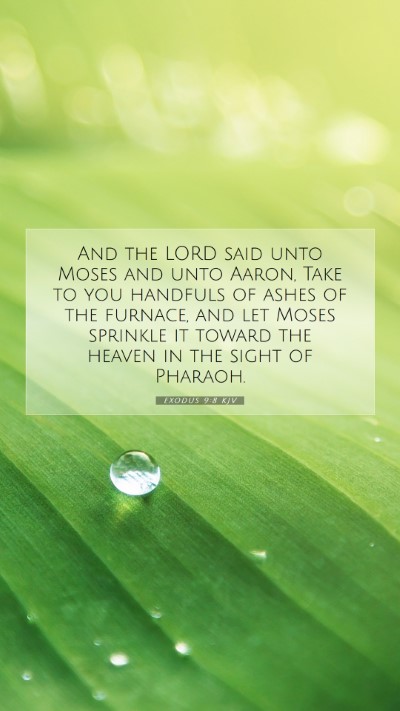Exodus 9:8 - Understanding the Verse
Exodus 9:8 states: "And the LORD said unto Moses and unto Aaron, Take to you handfuls of ashes of the furnace, and let Moses sprinkle it toward the heaven in the sight of Pharaoh." This verse is part of the account of plagues that God sent upon Egypt as a demonstration of His power and an effort to persuade Pharaoh to free the Israelites. The significance of this act involves both a direct challenge to Pharaoh's authority and a demonstration of God's sovereignty over the natural elements.
Bible Verse Meanings
The meaning of this verse encompasses God's command to Moses and Aaron to use symbolic actions that align with the impending plague. The ashes signify destruction and judgment, which foreshadow the boils that would come upon the Egyptians. This divine instruction is pivotal in understanding God's intentions towards an obstinate Pharaoh who has refused to release the Israelites.
Insights from Ancient Commentaries
Matthew Henry’s Commentary
Matthew Henry remarks that this act was a significant show of divine power. The ashes are both a literal and figurative representation of God's judgment. By directing Moses to sprinkle the ashes in front of Pharaoh, God emphasizes His authority over Pharaoh, making it clear that no earthly power can contend with His will. Henry highlights the contrast between the powerlessness of Pharaoh and the omnipotence of God, which is a central theme in the Exodus narrative.
Albert Barnes’ Notes
Albert Barnes emphasizes the role of the ashes as a symbol of death and decay. He points out that the act is not merely a ritual but serves as a warning to Pharaoh of the devastating consequences of his disobedience. Barnes notes that the fulfillment of the command acts as a precursor to the subsequent plagues, reinforcing the theme of God’s justice against Egypt’s disobedience. This commentary encourages readers to see the seriousness of God's pronouncements and the dire necessity for obedience.
Adam Clarke’s Commentary
Adam Clarke delves into the symbolism of the ashes further, explaining that ashes, typically associated with mourning and repentance, serve as a powerful reminder of human mortality and the inevitable consequences of rebellion against God. Clarke draws attention to the dramatic visual of Moses sprinkling the ashes toward heaven, suggesting a direct confrontation with Pharaoh's claim to divinity and power. He underscores the theological implications of this event as a contest between the God of Israel and the so-called gods of Egypt.
Bible Verse Interpretations
The interpretations of this verse go deeper into the nature of God’s relationship with humanity, especially with those in positions of power. This passage can be viewed as both a literal instruction for the time and a prophetic declaration of God's ultimate authority. The act symbolizes God’s intention to humble prideful leaders and establish His sovereignty through divine judgment.
Application of Exodus 9:8
In applying this verse to modern life, believers are reminded of the importance of humility before God. The act of Moses in carrying out God's command illustrates faith in action, showcasing a model for how one should respond to divine instructions. It challenges readers to consider how they react to God's directions in their own lives and emphasizes the critical nature of obedience.
Cross References
- Exodus 7:14-17 - God's first challenge to Pharaoh through Moses.
- Exodus 8:1 - The call to Pharaoh to release the Israelites.
- Exodus 9:10 - The fulfillment of Moses’ actions in the plague of boils.
Conclusion
This detailed analysis of Exodus 9:8 reveals essential truths about God’s nature and the significance of obedience. The verse serves as a reminder that God communicates His will through unique signs and that human resistance to divine authority is met with not just judgment but also an invitation to acknowledge the righteousness of God’s sovereignty.


